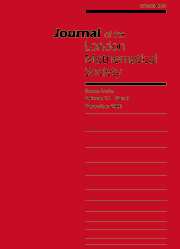Crossref Citations
This article has been cited by the following publications. This list is generated based on data provided by
Crossref.
Ebeling, W.
and
Gusein-Zade, S. M.
2005.
Radial Index and Euler Obstruction of a 1-Form on a Singular Variety.
Geometriae Dedicata,
Vol. 113,
Issue. 1,
p.
231.
Ebeling, W.
and
Gusein-Zade, S. M.
2006.
Global Aspects of Complex Geometry.
p.
129.
de Góes Grulha Júnior, Nivaldo
2008.
L’obstruction d’Euler locale d’une application.
Annales de la Faculté des sciences de Toulouse : Mathématiques,
Vol. 17,
Issue. 1,
p.
53.
Gaffney, Terence
2008.
The Multiplicity Polar Theorem and isolated singularities.
Journal of Algebraic Geometry,
Vol. 18,
Issue. 3,
p.
547.
Grulha, Nivaldo G.
Hernandes, Marcelo E.
and
Martins, Rodrigo
2012.
Polar multiplicities and Euler obstruction for ruled surfaces.
Bulletin of the Brazilian Mathematical Society, New Series,
Vol. 43,
Issue. 3,
p.
443.
Dutertre, Nicolas
and
Grulha, Nivaldo G.
2014.
Lê–Greuel type formula for the Euler obstruction and applications.
Advances in Mathematics,
Vol. 251,
Issue. ,
p.
127.
Maria Dalbelo, Thaís
de Góes Grulha Jr., Nivaldo
and
Silva Pereira, Miriam
2015.
Toric surfaces, vanishing Euler characteristic and Euler obstruction of a function.
Annales de la Faculté des sciences de Toulouse : Mathématiques,
Vol. 24,
Issue. 1,
p.
1.
Ament, D. A. H.
Nuño-Ballesteros, J. J.
Oréfice-Okamoto, B.
and
Tomazella, J. N.
2016.
The Euler obstruction of a function on a determinantal variety and on a curve.
Bulletin of the Brazilian Mathematical Society, New Series,
Vol. 47,
Issue. 3,
p.
955.
Dalbelo, T. M.
and
Pereira, M. S.
2016.
Multitoric surfaces and Euler obstruction of a function.
International Journal of Mathematics,
Vol. 27,
Issue. 10,
p.
1650084.
Ament, D. A. H.
Nuño-Ballesteros, J. J.
Oréfice-Okamoto, B.
and
Tomazella, J. N.
2016.
The Euler obstruction of a function on a determinantal variety and on a curve.
Bulletin of the Brazilian Mathematical Society, New Series,
Vol. 47,
Issue. 3,
p.
955.
Callejas-Bedregal, Roberto
Morgado, Michelle F. Z.
Saia, Marcelo J.
and
Seade, José
2016.
The Lê-Greuel formula for functions on analytic spaces.
Tohoku Mathematical Journal,
Vol. 68,
Issue. 3,
Ebeling, Wolfgang
and
Gusein-Zade, Sabir M.
2017.
An Equivariant Version of the Euler Obstruction.
Bulletin of the Brazilian Mathematical Society, New Series,
Vol. 48,
Issue. 2,
p.
199.
Dutertre, Nicolas
and
Grulha, Nivaldo G.
2020.
Global Euler obstruction, global Brasselet numbers and critical points.
Proceedings of the Royal Society of Edinburgh: Section A Mathematics,
Vol. 150,
Issue. 5,
p.
2503.
Dalbelo, Thaís M.
and
Hartmann, Luiz
2020.
Brasselet number and Newton polygons.
manuscripta mathematica,
Vol. 162,
Issue. 1-2,
p.
241.
Santana, Hellen
2021.
Brasselet Number and Function-Germs with a One-Dimensional Critical Set.
Bulletin of the Brazilian Mathematical Society, New Series,
Vol. 52,
Issue. 2,
p.
429.
Grulha, Nivaldo G.
Ruiz, Camila M.
and
Santana, Hellen
2022.
The geometrical information encoded by the Euler obstruction of a map.
International Journal of Mathematics,
Vol. 33,
Issue. 04,
Brasselet, Jean-Paul
2022.
Handbook of Geometry and Topology of Singularities III.
p.
303.
Callejas-Bedregal, Roberto
Morgado, Michelle F. Z.
and
Seade, José
2022.
Handbook of Geometry and Topology of Singularities III.
p.
493.
Zach, Matthias
2022.
A generalization of Milnor’s formula.
Mathematische Annalen,
Vol. 382,
Issue. 1-2,
p.
901.
Maxim, Laurenţiu
and
Tibăr, Mihai
2023.
Morse numbers of function germs with isolated singularities.
The Quarterly Journal of Mathematics,
Vol. 74,
Issue. 4,
p.
1535.

